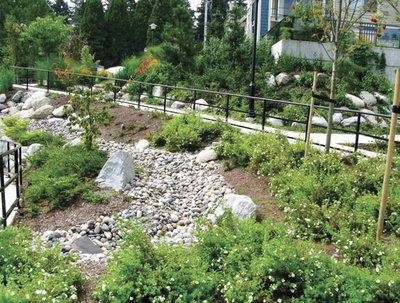Can ordinary residents help resolve flooding and other problems caused by Jersey City’s aging combined sewer system? The grassroots environmental group Sustainable Jersey City, known as Sustainable JC, believes they can and the organization has launched a crowd funding campaign to prove its case.
Using the web site www.IOBY.org, a crowd funding site for environmental-oriented projects, Sustainable JC is currently trying to raise $4,361 to help build a rain garden at St. Paul’s Lutheran Church, at 440 Hoboken Ave.
As of Oct. 31, the group had raised $1,070 towards its goal.
Flooding is a growing problem in parts of the city and one that is of increasing concern to residents, thanks in part to Hurricane Irene and Superstorm Sandy. Both storms flooded homes and businesses in the city’s low-lying areas and caused hundreds of thousands of dollars in damage. Older properties located in the historic neighborhoods downtown, which are just blocks from the Hudson River, and properties that border the Hackensack River on the city’s West Side, are among those that have been most impacted.
Some residents in the Van Vorst and Paulus Hook neighborhoods have said that even heavy rainstorms can now cause flooding and sewage back-ups in their homes.
While the city has installed water pumps to alleviate the flooding, and has additional plans to reopen an old treatment facility which would be used as a water retention site during heavy storms, Sustainable JC believes environmental options should be explored as well.
Interest in rain gardens has increased in recent years as flooding in Jersey City has become a bigger problem.
____________
Water gatherers
Like many cities in the northeast and Great Lakes region, storm water in Jersey City drains into the same underground system of pipes as raw sewage. This is known as a combined sewer system. Cities outside the Northeast and Great Lakes regions are more likely to have separate drainage systems for their sewage and storm water overflows.
When functioning properly, a combined system drains raw sewage and storm water without incident. In the event of major rainstorms, however, combined systems can become overwhelmed, unable to handle all the water being carried through the pipes. Water overflows can back up into homes and drain into both rivers that border Jersey City, leaving raw, untreated sewage in its wake.
Flooding can be exacerbated if sewage pipes are poorly maintained and clogged and if green spaces have been paved over due to new construction and development.
Environmentalists point out that natural earth that has not been paved over serves as a natural drainage system for floodwaters. Hence, the interest in rain gardens has increased in recent years as flooding in Jersey City has become a bigger problem. Sustainable JC believes that the creation of “green infrastructure,” like rain gardens, would alleviate some of these problems.
“A rain garden is actually more than just a standard garden. It’s more than just an unpaved open area,” explained Sustainable JC spokesperson Dana Bakirtjy. “Thirty percent more water soaks into the ground with rain gardens than traditional lawns, and that’s because of the different materials that are used.”
A rain garden, she said, uses a blend of different types of soil and mulch that are known to absorb water uniquely well.
Minimizing flood impact
A rain garden is a garden specifically designed to soak up rainwater from rooftops, as well as runoff from driveways and patios. Rain gardens look like traditional flower gardens but they also function as a stormwater management tool. They are designed to intercept, treat, and infiltrate stormwater at the source, before it really becomes runoff. Managing stormwater on a site helps to reduce flooding and combined sewer overflows. Rain gardens also help breakdown contaminants that could otherwise harm nearby waterways.
The garden planned for St. Paul’s Lutheran, which will be planted by the New Jersey Tree Foundation with money from the crowd funding campaign and a grant from the Geraldine R. Dodge Foundation, will likely include flower and plant species native to the region, said Bakirtjy.
While the Jersey City Environmental Commission has endorsed the creation of rain gardens and Mayor Steven Fulop has expressed support for the concept as well, the city has not made them, or the creation of other so-called green infrastructure, a priority. Sustainable JC hopes the demonstration projects at St. Paul’s Lutheran Church and NJCU will create interest among residents who will push the city to explore these environmental options.
“Sustainable JC is the only group pursuing rain gardens,” said organization founder Debra Italiano. “We hope we can draw in the mayor’s office and the Jersey City Environmental Commission to work with us.”
While creating rain gardens does not replace the need to upgrade and repair an outdated sewer system, it can help minimize the impact of heavy rains and educate the community about sustainable land use, according to Italiano.
“I want to show people that instead of having a concrete lawn [why not] have a beautiful green garden,” said Italiano.
A growing trend?
The rain gardens planned for St. Paul’s and NJCU will not be a first for Jersey City.
Last year, the United States Postal Service teamed up with Chyun Associates and the Rutgers Cooperative Extension Water Resources Program to install a 1,450 square foot rain garden at the upgraded customer entrance at the Bergen Station South Post Office located on Martin Luther King Jr. Drive.
And Sustainable JC planted a permaculture garden in Hudson County’s Washington Park, which borders Jersey City and Union City near Paterson Plank Road.
“There was overflow that was not being managed,” said Italiano about Washington Park.
The permaculture garden uses strategically placed soil and plantings to prevent water from running onto the streets.
The online crowd funding campaign ends on Tuesday, Nov. 26. To make a donation, visit https://www.ioby.org/project/sjcs-rain-gardens-art-campaign.
E-mail E. Assata Wright at awright@hudsonreporter.com.
